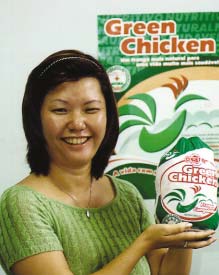COCCI Focus - Thinking Green
Brazil's Osato Alimentos uses coccidiosis vaccine to ride hot wave in poultry production
 According to Paulo Tsuyoshi
Osato, president of Osato
Alimentos, the relationship
between the poultry integrator
and the pharmaceutical firm
coincides with global market
trends to meet the increasing
demand for natural and
healthy foods.
|
These days, success in food production
hinges in large part on
creating marketing niches. In
Brazil, one poultry producer is successfully
creating a global niche with
Green Chicken.
The Green Chicken. concept was
hatched in 1998 when a Brazilian poultry
integrator called Osato Alimentos
decided to target the rapidly expanding
consumer segment that purchases "natural
chicken," meaning, birds raised
without antibiotics and growth promotants.
Based in Atibaia in Brazil's state of
São Paulo, the firm faced a major challenge.
Since "natural" poultry production
practices weren't widely implemented
in Brazil at that time, little
related husbandry information was
available.
The new project got off to a great
start when Osato formed an alliance
with Coopers Brazil, a subsidiary of
Schering-Plough Animal Health
Corporation.
"Starting in June 1998, we conducted
three trials to determine if the use of
the Schering-Plough Animal Health's
coccidiosis vaccine was economically
and technically feasible," says Pedro
Shingi, a technical assistant for Osato.
"All results were favorable, so we
decided to replace in-feed coccidiostats
with a vaccination program at our
farms near company headquarters.
Logistically, that would make monitoring
and follow-up management easier."
With positive trial results in hand,
the first chickens bearing Osato's
Green Chicken. trademark were bred.
Coopers personnel helped Osato
develop a protocol to administer
Coccivac-B on day-old chicks with the
Spraycox spray cabinet, which showers
up to 100 day-old chicks at a time with
the vaccine. This technology enabled
Osato to vaccinate up to 80,000 birds
per hour, dramatically reducing labor
costs.
Anticoccidials, including nicarbazin
and monensin, were eliminated from
the feed, as were growth promotants
such as zinc bacitracin and virginiamycin.
Prebiotics and probiotics were
added to the ration to help colonize
beneficial intestinal bacteria and prevent
the activity of pathogenic bacteria
such as Salmonella, E. coli, and Campylobacter
species.
More Positive Results
Since implementing this new management
regime, Osato Alimentos has
experienced a significant reduction in
all diseases and mortality rate, according
to Marcos Palotta, Osato's technical
manager.
"At 40 days of age, vaccinated birds
normally start to show a compensatory
weight gain, and at 50 days their
weight surpasses 5.17 lb. (2.35 kg.),"
Palotta says, referring to the fast weight
gain vaccinated birds show after an initial
setback.
Coopers continues to provide technical
support for Osato's Green
Chicken production, including monthly
coccidiosis lesion scoring.
In addition to increased production
benefits with its Green Chicken., Osato
is enjoying gains relative to the bottom
line. With Coopers also providing marketing
assistance, sales of Green
Chicken have been increasing steadily
since the product first hit the Brazilian
marketplace in November 2000.
Currently, Green Chicken. can be
found in more than 400 retail outlets in
the state of São Paulo. Butcher shops and grocery stores currently account
for 50% of Osato's total Green Chicken.
sales. Supermarkets and restaurants
round out the remaining portion, with
30% and 20%, respectively.
Osato expects to process 2 million
Green Chicken. broilers this year, while
total Brazilian production of the specialty
is expected to reach 30 million
birds. While it costs an average of 3%
to 5% more to produce Green Chicken.
compared to standard chicken, the former
brings about 20% more at the retail
level, according to Vilson Simon, director
of AviSui, the Poultry and Swine
Division at Coopers Brazil.
"We feel these figures reflect product
acceptance in specific consumer
markets," says Maria Paula Yuko Osato,
a marketing consultant for the firm.
"Since Green Chicken. is readily available
in several types of retail venues,
consumers can easily include the product
in their daily routine, even when
dining out."
According to Yuko Osato, Osato
Alimentos is marketing Green Chicken.
as a product that is lower in fat content,
more uniform in appearance, more
palatable and emanating a more desirable
aroma, compared to conventionally
raised birds. Yuko Osato believes
that, relative to the big picture and the
long haul, Green Chicken. offers several
consumer benefits, including healthier
food, greater quality of life and
longevity.
Global Player
 The Green Chicken concept was
hatched in 1998 Osato Alimentos
decided to target the rapidlyexpanding
consumer segment
that purchases 'natural chicken,'
specifically, birds raised without
antibiotics and growth promotants.
|
Osato Alimentos has a 37-year tradition
in the global poultry and food markets.
The firm processed 18.5 million birds in
2000. This year, production is projected
at 24 million birds.
For all of its products, Osato currently
has over 3,000 customers worldwide,
including restaurants, fast-food
outlets, grocery stores, hypermarkets
(large chain retailers similar to Wal-
Mart), supermarkets, hospitals, and
caterers. Total sales reached $30 million
in 2000 and are expected to hit $40 million
this year.
During the
1980s, Osato pioneered
the development
of differentiated
poultry
products and initially
cultivated a
strong export market
with Japan.
Today, Osato's
export customers
include Japan,
Hong Kong and
Europe. Major
product offerings
for these venues
include filets of
thigh, filets of
breast, wings, and
differentiated cuts.
Osato's overseas
sales reached $6
million last year.
The forecast for 2001 exports is $10
million.
In October 2000 Osato satisfied the
licensing requirements of the European
Union to sell drug-free meat in Europe.
Teamwork Pays Off
The alliance between Osato and
Coopers relative to Green Chicken. is a
win/win work in progress. Osato continues
to develop a successful marketing
niche. Coopers continues to build
its database of technical information
relative to coccidiosis control in a drugfree
broiler production model.
According to Paulo Tsuyoshi Osato,
president of Osato Alimentos, the relationship
between the poultry integrator
and the pharmaceutical firm coincides
with global market trends to meet the
increasing demand for natural and
healthy foods.
"We are both committed to providing
consumers throughout the world
with healthy poultry products, so we
believe Green Chicken.. and our partnership
will continue to be successful,"
Tsuyoshi Osato says.
Source: CocciForum Issue No.3, Schering-Plough Animal Health.







